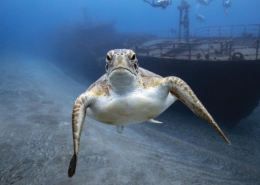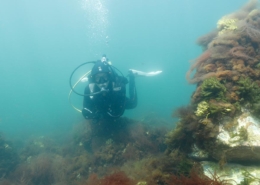Red Sea Study Reveals Hope for the Future
Article by Alex Brylske
News Release
Scuba divers recognize the Red Sea as one of the world’s most vibrant underwater places, famous for its healthy reefs and colorful marine life. Now, new research gives a look into how some of its corals might handle a warming climate—and the results are both hopeful and sobering.
A team of researchers from The Ohio State University, the Centre Scientifique de Monaco, and the University of Konstanz studied Stylophora pistillata (commonly called Hood or Smooth Cauliflower Coral), a branching coral common throughout the Red Sea. Known for its bleaching resistance, this coral has long intrigued scientists who hope it may hold clues to how reefs might survive rising ocean temperatures.
In a controlled six-month study, colonies were subjected to temperatures aligning with climate change predictions for the end of this century: 27.5°C (81.5°F) and 30°C (86°F). For comparison, healthy corals were kept at today’s average of 25°C (77°F).
The results? All of the corals survived—but they did not thrive. Colonies at 27.5°C (81.5°F) grew 30% less than controls, while those at 30°C (86°F) shrank by 70%. Their metabolic demands also increased, meaning the corals had to work harder just to survive.
Early in the experiment, the corals showed little stress, indicating a short-term window of resilience. However, as the months passed, their growth slowed significantly. Even though they maintained tissue and energy reserves, the trade-off was a reduction in skeleton-building, which is vital for reef growth and habitat complexity.
When temperatures were lowered back to 25°C (77°F) for a month, the corals partially recovered, regaining pigmentation and showing signs of metabolic healing. However, they did not regain the growth lost during the heated months. As one researcher said: “Survival is certainly the number one important thing for coral, but when they’re physiologically compromised, they can’t do that forever.”
For scuba divers, this study underscores both the resilience and fragility of reefs. The good news is that some corals, like those from the northern Red Sea, can endure periods of heat stress that would devastate reefs elsewhere. The sobering news is that survival without growth results in weaker reef structures, less habitat for marine life, and ultimately, reduced biodiversity.
If reefs lose their ability to grow and maintain structure, the ripple effects will affect not only the fish and invertebrates that divers enjoy seeing but also the people who depend on reefs for food, tourism, and coastal protection.
Researchers suggest that conservation efforts should prioritize areas where naturally resilient corals already exist, such as parts of the Red Sea. By protecting these “strongholds,” managers can improve reefs’ chances of survival in the future. Establishing protected areas could safeguard the ecosystems most likely to succeed as “high-probability reefs” for the decades ahead.
As divers, we witness the ocean’s changes firsthand. This study serves as a reminder that even the strongest corals are not invulnerable. Although they may withstand warmer waters, the long-term outlook could still be one of shrinking colonies and reduced reefscapes.
Every dive trip and decision we make—whether reducing carbon footprints, supporting reef-friendly tourism, or participating in conservation efforts—matters. Protecting reefs like those in the Red Sea today can help ensure future generations of divers can still explore thriving coral ecosystems.
You can download the full research study published in Science for the Total Environment.











Hello fellow divers.
I can confirm situation described in this artickle – corals and under water life is dying.
I have been diiving in Red Sea for more than 11 years and I am eye wittnes of this destruction.
I admired sea life 10 years ago, these days I stripe off corals from their microten plastics coats.
Less and less demanding divers, more and more boats , packed by naive holiday makers.
Solutions ? Probably nope, people all around the world are going to keep their comfort. Until…